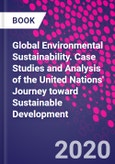Global Environmental Sustainability: Case Studies and Analysis of the United Nations' Journey toward Sustainable Development presents an integrated, interdisciplinary analysis of sustainable development, addressing global environmental problems in the contemporary world. It critically examines current actions being taken on global and local scales, particularly in relation to the UN's efforts to promote sustainable development. This approach is supported by empirical analysis, drawing upon a host of interweaving insights spanning economics, politics, ecology, environmental philosophy, and ethics, among others. As a result, it offers a comprehensive and well-balanced assessment of the overall perspective of sustainable development supported by in-depth content analysis, theoretical evaluation, empirical and actual case studies premised on solid data, and actual field work. Also, the book marks a milestone in placing the Covid-19 pandemic into a perspective for understanding the universality of human collective environmental behavior and action.
By utilizing in-depth analysis, both quantitative and qualitative, and challenging the status quo of what is expected in the global approach to sustainable development, Global Environmental Sustainability provides the theory and methodology of empirical sustainable development which is especially germane to our advanced society today, which is deeply entrenched in a crisis of environmental morality. More particularly, it serves as a salient source of moral reconstitution of society grounded in empirical reality to liberate man's excessive spirit of individualism and self-aggrandizement to the detriment of the environment. Epistemologically, the book furnishes a remarkable tour de force with a new level of analytical insight to help researchers, practitioners, and policymakers in sustainability and environmental science, as well as the many other disciplines involved in sustainable development, to better understand sustainability from a new perspective and provides a methodological direction to pursue solutions going forward.
Please Note: This is an On Demand product, delivery may take up to 11 working days after payment has been received.








